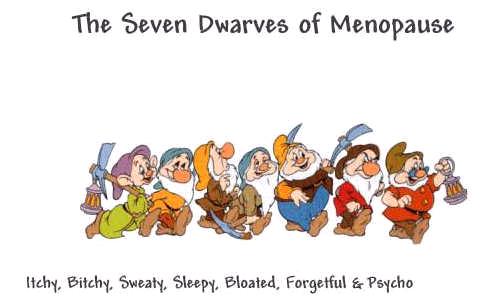Introduction
Menopause is the phase of a woman’s life when her menses stop. This is because her ovary stops producing oestrogen and progesterone hormones. As a result of hormonal changes, many women experiences physical and emotional symptoms.
Symptoms of menopause and prevalence
About 80% of women experience different symptoms of menopause of different intensity. Besides the common vasomotor symptoms of hot flushes and headaches, some women experience mild forms of mood changes such as feeling easily irritated or upset. Others would suffer from more severe symptoms such as rapid temper changes or severe mood swings. The common symptoms of menopause can be simply described as in the diagram below:

Description of menopause symptoms
With regards to the mental health aspect, the symptoms of menopause have an effect on mood and interpersonal relationship, therefore to a certain extent lead to a decrease quality of life.
Common mood changes experienced during the menopausal period includes:
- Anxiety symptoms such as palpitations, sweating and dizziness
- Depressed or unstable mood
- Irritability
- Low self esteem
- Lack of motivation
- Lack of energy
- Poor concentration
- Poor sleep (insomnia)
- Memory and concentration problems (forgetfulness)
Some women are more at risk to develop mood changes. They include:
- Those who experience frequent and moderate to severe hot flushes
- Those who have a past history of depression
- Those with other factors that increase risk of depression such as
- Poor inter-personal relationship satisfaction
- Significant and stressful life events
- Low self esteem
- Negative attitude towards menopause and aging
- Little or no exercise
- Smoking and use of alcohol
Mood Disorders during menopause
Among the more common mood disorders during menopausal period includes:
- Depression– It has been estimated that about 20% of women in United States suffers from depression at some point during menopause.
- Sleeping problems– Insomnia is among the commonest problem encountered. Around 40 – 50 % of women reported to have sleeping problem during menopause and this may or may not be related to mood disorders.
- Panic disorder– Panic disorder is also common among women during menopause and these attacks were associated with negative life events, functional impairment and the presence of medical illness.
How to handle
The following are some tips to reduce the impact of mood changes:
- Practise sleep hygiene to improve sleep duration and quality. Go to bed and wake up at the same time every day, ensure bed room is comfortable, not too hot, too cold or noisy.
- Regular exercise to promote better sleep, which in turn can improve mood
- Do regular mental stimulation such as doing crossword or puzzles, reading books and play chess. The aim is to maintain cognition and reduce symptoms of poor concentration and forgetfulness
- Engage in social activities to improve mental function
- Learn relaxation techniques and stress reduction strategies to reduce anxiety and stress symptoms
- Identify cause of stress and try to reduce or manage them appropriately
- Learn about menopause and mood symptoms. Understanding about this and the availability of treatment may help to overcome the unnecessary worries
- Talk to your friends who are experiencing similar problems (or join support group) and you may learn ways how to cope with your symptoms
- Work on your relationship with your partner, your family members and friends as satisfying relationship is important to reduce the impact of mood changes
- Ask your doctor about therapy and medicines. Hormone replacement therapy and antidepressant might help if indicated.

References:
- http://womenshelath.gov/menopause
- http://www.virtualmedicalcentre.com
- http://emedicine.medscape.com/article/295382-overview
| Last Reviewed | : | 9 October 2013 |
| Writer | : | Dr. Mazni Mat Junus |







